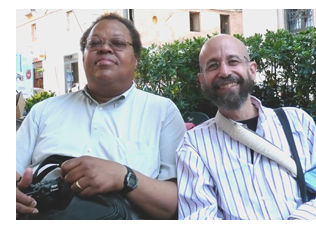| Sun | Mon | Tue | Wed | Thu | Fri | Sat |
|---|---|---|---|---|---|---|
| 1 | 2 | 3 | 4 | 5 | ||
| 6 | 7 | 8 | 9 | 10 | 11 | 12 |
| 13 | 14 | 15 | 16 | 17 | 18 | 19 |
| 20 | 21 | 22 | 23 | 24 | 25 | 26 |
| 27 | 28 | 29 | 30 | 31 |
CATEGORIES
RECENT ENTRIES
BLOG ROLL
I improvise, therefore I am
 A shared quest to better understand improvisation—in art and life—joins two academics in an uncommon dialogue.
A shared quest to better understand improvisation—in art and life—joins two academics in an uncommon dialogue.
“Artists teach people how to live,” said the jazz trumpeter Lester Bowie. And those who improvise may be the best teachers of all, argue philosopher Arnold Davidson and music scholar George Lewis.
This fall, they are coteaching a graduate seminar that explores improvisation “in many different disciplines and aspects of collective and individual life,” says Davidson, a Chicago professor whose scholarship crosses the boundaries of philosophy, history, comparative literature, and religion. Lewis, U-High’69, is on loan from Columbia University, where he teaches American music and directs the Center for Jazz Studies. He is also a trombonist, composer, and computer-music pioneer.
On November 12, Lewis will lead an evening of music and conversation at Mandel Hall featuring Davidson, free-jazz pianist Alexander von Schlippenbach, and the Association for the Advancement of Creative Musicians' Great Black Music Ensemble. Last week, the pair spoke on “Improvisation as a Way of Life” at a forum sponsored by the Franke Institute for the Humanities. The ideas—like free improvisation—weren’t always easy to follow, but they were catchy enough to get listeners thinking. Here are some excerpts.
Davidson: “In the history of 20th-century music, a great cultural contribution of the development of jazz is its demonstration that improvisation can assume all of the characteristics of a philosophical practice. Improvisation is not only an aesthetic practice but also an ethical and political exercise. All things considered, improvisation—for the person who plays and the person who listens—is a transformation of the world and of ourselves.”
Lewis: “In my view, improvisation is everywhere but it’s very hard to see, being fundamental to the existence and survival of every human formation from the individual to the community … Those of us who study improvisation seriously find ourselves at the center of things even as the myth of our marginality, our academic subalternity, if you will, is ever more anxiously repeated.”
Davidson: “The creation of new forms of social meaning often demands an exercise of seeing and thinking differently: an askesis of the self … [Improvisation is] part of the indefinite work of enlarging our spaces of freedom … Improvisation is the concrete form that freedom takes.”
Lewis: “The World Wide Web … has evolved into a dynamically and constantly changing society that’s the largest collective improvisation ever created: active in all time zones, 24 hours a day; as globalized as anything ever built on this planet … assimilating vast asymmetries of agendas—corporate, collective, individual—cultural viewpoints, infrastructure …”
Davidson: “When someone says to me, ‘I don’t like listening to free improvisation,’ I take that as a starting point … It takes some work, but there’s a pleasure that you will not get any other way.”
Lewis: “I don’t see pleasure as a goal. For me, improvisation is a space of learning and a space of opportunity. And what you learn may not be that pleasurable … The condition of improvisation can lead us in many different directions in our everyday lives … What I’m trying to get to is the larger question of how improvisation is a fundamental condition of being in the world, and in that sense, it goes well outside the aesthetic domain and the goal has actually something to do with living the life that you want to lead.”
Davidson: “With respect to everyday life, the main task is not to locate its improvisatory moments—which are typically numerous, even indeterminate—but to identify those dimensions of our life that are not usually subject to improvisation, but remain fixed and often invisible and provide the stabilized framework of constraints within which we improvise … No life should be the endless repetition of the same melody and we should sometimes attempt to experiment, without having to lean on any identifiable and so reassuring melody … What we should try to do is make our improvisations as broad and responsible, as forceful and intelligible, as our capacity for creative discomfort will allow. The space of liberty is up to us.”
Elizabeth Station
October 27, 2010
